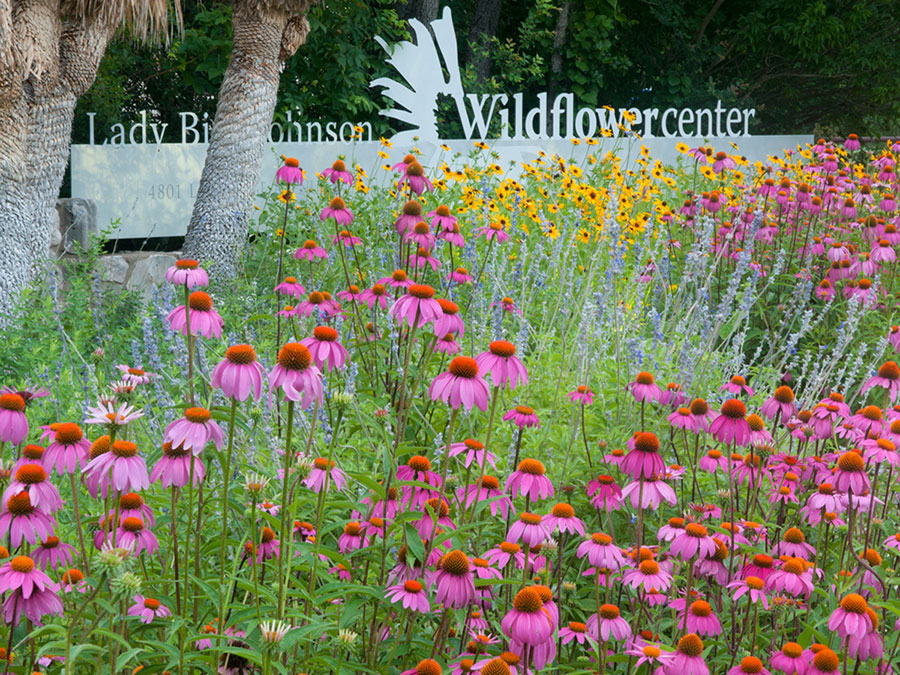PRESSROOM
Wildflower Center Designated Texas State Botanic Garden and Arboretum

The entrance of the Wildflower Center welcomes visitors to explore the native plants of Texas.
AUSTIN, Texas – The University of Texas at Austin’s Lady Bird Johnson Wildflower Center has received honorary designation from the Texas Legislature as the State Botanic Garden and Arboretum, recognizing the critical role the Wildflower Center plays in conserving the native plants and landscapes of Texas.
The designation arises from House Bill 394, authored by Rep. Donna Howard (D-Austin) and joint-authored by Rep. Paul Workman (R-Austin) and Rep. Roberto Alonzo (D-Dallas/Fort Worth). The bill was sponsored in the Senate by Sen. Kirk Watson (D-Austin) and co-sponsor Sen. Donna Campbell (R-New Braunfels).
“The Wildflower Center is an unparalleled resource in our state, providing conservation, education and consulting programs to preserve and protect our environment,” said Gregory L. Fenves, president of the university. “We are deeply honored that the Texas Legislature has designated the center as the State Botanic Garden and Arboretum of Texas.”
“The Wildflower Center is uniquely Texan, and I’m pleased the state has chosen to recognize it as such,” said Rep. Howard. “Between its roots with Lady Bird Johnson, its unrivaled acres of native Texas flora and its forward-thinking collaboration with state agencies, the Lady Bird Johnson Wildflower Center has surely earned this recognition. I hope this encourages all Texans to get outside and spend time with the beautiful and diverse landscapes at the Wildflower Center and learn about how they, too, can enjoy these plants and trees in their own communities.”
“This designation recognizes the Wildflower Center’s important contribution to the natural history of Texas,” said Sen. Watson. “In the words of Lady Bird Johnson, ‘the environment is one thing all of us share’, and this well-deserved honor for the Wildflower Center will help us preserve and protect the native plants and landscapes for all Texans. I loved knowing Mrs. Johnson and being able to learn from her. I’m very proud that this wonderful part of her legacy is receiving this important recognition.”
No state funding accompanies the designation. The Wildflower Center remains a self-funded unit of The University of Texas at Austin, with critical operating support coming from admissions, memberships, donations and other sources of earned revenue.
The Lady Bird Johnson Wildflower Center is the largest all-native garden in the state, with 284 acres of gardens and natural areas that feature more than 800 native plant species from the mountains of West Texas to the Coastal Prairies. The center’s 16-acre Mollie Steves Zachry Texas Arboretum features native trees from across the state, including the progeny of historically significant live oak trees (the “Hall of Texas Heroes”).
Since its establishment in 1982 by Lady Bird Johnson and Helen Hayes, the Wildflower Center has committed itself to serving the state and nation through its conservation, education, research and consulting programs.
“Botanic gardens such as ours play a critical role as hubs for plant conservation and environmental education and in developing innovative landscape practices,” said Patrick Newman, executive director of the Wildflower Center. “We are honored to receive this acknowledgement of our efforts to conserve Texas’ floristic heritage.”
Its plant conservationists have collected and stored millions of seeds from Texas native plants for future restoration and research efforts. Center environmental designers have helped to create native landscapes across more than 90,000 acres in Texas and other states, from the George W. Bush Presidential Center in Dallas to the San Antonio Mission Reach Restoration and Dell Medical School.
The center’s gardens, which opened in South Austin in 1995, and informal education programs provide environmental education to more than 140,000 guests and 10,000 Texas teachers and students annually. Its North American native plant database is one of the most comprehensive in the U.S., providing in-depth plant information for more than one-third (8,000 species) of U.S. native plants.
For more information, contact Lee Clippard at [email protected] and 512-232-0104 or Angel Horne at [email protected] and 512-232-0105.
